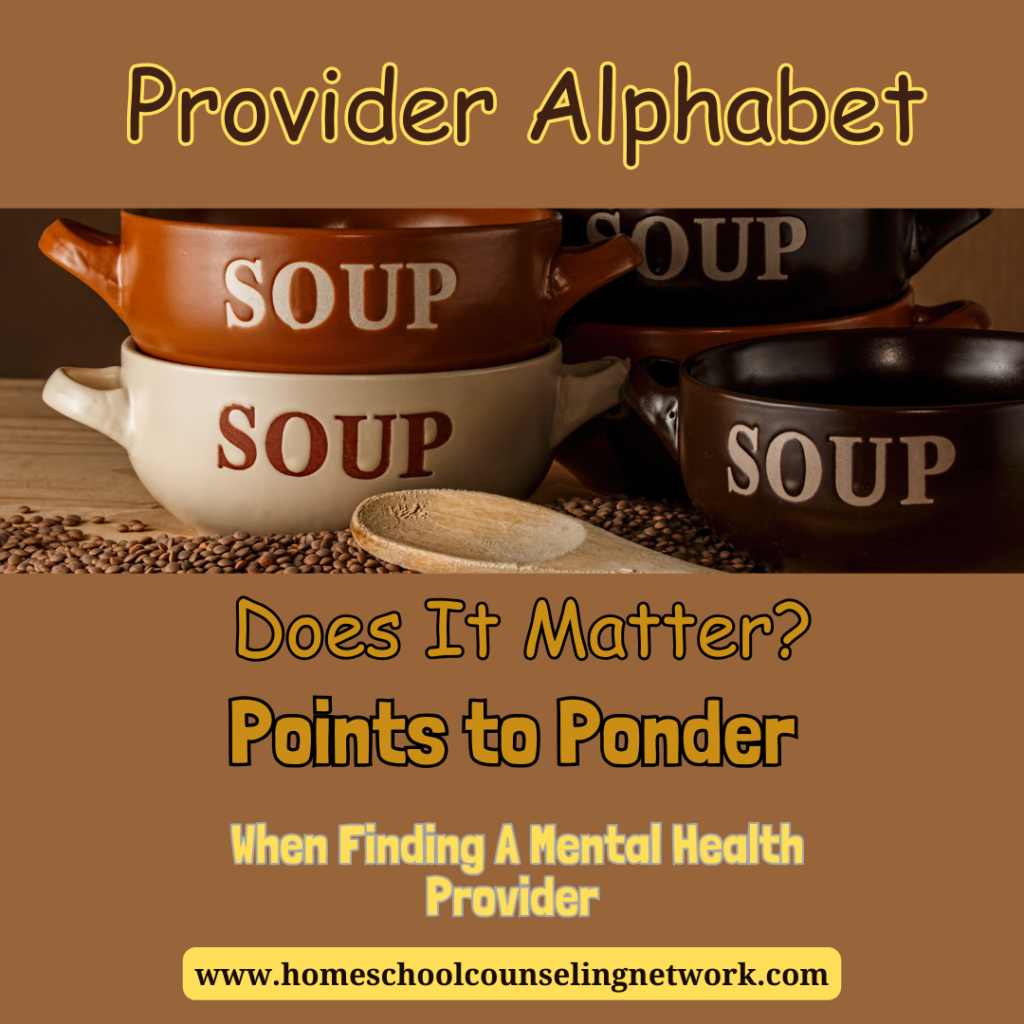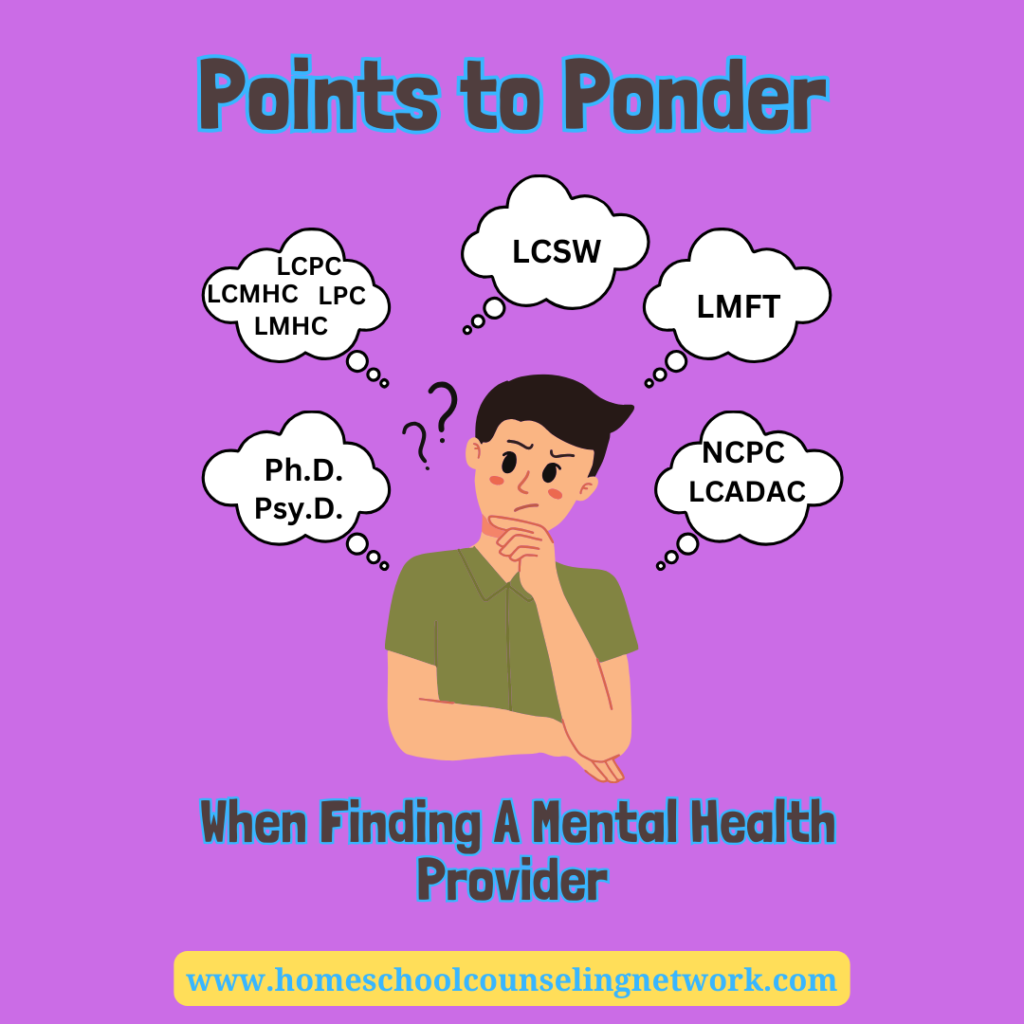Alphabet Soup: Homeschoolers in the Client-Therapist Relationship

Earlier on our blog, we welcomed you to The Homeschool Counseling Network, outlined our mission and vision, highlighted how different mental health providers can support homeschooling families, touted the merits of allied health professionals, and introduced you to Counseling 101.
More recently, we taught you about the importance of performing due diligence before entering into a client-professional relationship, including how to spot red flags.
Today we will explore some important points to ponder about the client-therapist relationship.
Finding the Right Fit
Trying to find the right fit professional for your family’s mental health needs can feel overwhelming.
Should you choose a doctoral-level or master’s level clinician?
Full transparency?
The flavor of alphabet soup that falls behind a provider’s name is irrelevant.
Whether the therapist is a social worker, a counselor, a psychologist, or a marriage and family therapist does not matter. What matters is a strong, positive working relationship between client and clinician that is based on openness and trust.
Training and Experience
Degree level aside, it is important to inquire as to whether your professional has experience working with the topic or area of interest for which you are seeking intervention.
We call this scope of practice.
Think of it in terms of visiting an internal medicine specialist to remove a suspicious mole instead of a dermatologist. While both are physicians, one has specific training for the job.

Safety and Security
Therapy, by nature, is an intimate process.
On the proverbial couch, we reveal our innermost thoughts, histories, and experiences. We lay ourselves bare. We expose the deepest parts of ourselves in hopes of being accepted.
Regardless of whether we have unhealthy thoughts that need to be challenged, unhealthy behaviors that need to be changed, or unhealthy relationships that need to be transformed or released, we can rest in the comfort of knowing our therapist is on our side as a person.
Our therapist is in our corner, cheering us on and accepting us just as we are right now while simultaneously helping us to become the people we want to be.
As cliche as the term safe space has become, that is exactly what a therapist’s office should be. An environment where a client can share openly and honestly, without fear of being rejected or shamed. Through the fostering of this trust, the client can take risks, process past traumas, and heal.
Feeling safe and secure in your provider’s office is paramount. A place where you can learn to lean into curves and bend in the wind. A place to grow while learning to cope with the growing pains.
Unconditional Positive Regard
Many would call this unconditional love. In therapy, it’s pretty close. We call it unconditional positive regard.
Unconditional positive regard is a term first coined by the late psychologist, Carl Rogers. Carl Rogers was the founder of client-centered therapy or person-centered therapy.
Of all of the therapeutic interventions I learned in my graduate studies en route to becoming a counselor, the Rogerian method by far had the greatest impact on me, both personally and professionally.
At the heart of unconditional positive regard and person-centered therapy lies love and grace – two concepts from which we all can benefit.
Coming Up
Be sure to check back in with us for our next blog post where we talk about the human side of helping. Providers are human, too. We all have feelings, have bad days, and make mistakes. But what should you do if bad therapist behavior is the norm? Stay tuned to learn more.
Keep In Touch
Be sure you do not miss a blog post by signing up for our email list, liking our Facebook, Instagram, Linked In, or Pinterest pages, or subscribing to our YouTube channel.
Like what you see here? Sharing is caring!
Blessings,
Kimberly Bennett, LPC
IOH Mom
Founder/CEO, It’s Only Homeschooling
Founder/CEO, The Homeschool Counseling Network

This website is not a professional counseling website and nothing here should be construed as professional counseling advice. Although Kimberly Bennett, LPC is a Licensed Professional Counselor, she is not your counselor, and no counselor-client relationship is established unless she has signed an agreement with you. All information provided through this website is for informational and educational purposes only.